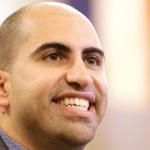The Salaita Case and the Big Money Takeover of State Universities

Responding to an academia-wide furor about the firing of a faculty member over a series of provocative tweets on Israel and Gaza, the University of Illinois board of trustees last week took a vote on the case.
They voted 8 to 1 to uphold the firing. This can rightly be seen as a blow to the very concept of academic freedom, but there's another sinister undercurrent to the case: there's evidence that major donors put pressure on the board and the university administration to dump the professor, Steven Salaita. If so, it wouldn't be the first time that financial donors have tried to manipulate university administrations into doing their bidding, but it's certainly one of the most disturbing examples of a bad trend.
First, the background. As we reported last month, Salaita is a respected scholar in American Indian studies and Israeli-Arab relations whom the University of Illinois hired away from Virginia Tech and placed in a tenured position. Salaita's moving expenses to the university's Urbana-Champaign campus were paid, and he was given a class schedule for the current semester.
Then a series of tweets he wrote about the Israel-Gaza battle surfaced. They were passionate and provocative. One read, "At this point, if Netanyahu appeared on TV with a necklace made from the teeth of Palestinian children, would anybody be surprised?" Others suggested that Israel's bombing of Gaza would spur anti-Semitism. His twitter feed is here.
The university revoked Salaita's appointment. Among its defenses is that, while out-of-classroom tweets like his would not lead to a faculty member's firing, Salaita wasn't really a faculty member because the board of trustees hadn't yet rubber-stamped his appointment.
University Chancellor Phyllis Wise said that she merely had decided not to refer Salaita's appointment to the board, so in effect he wasn't fired, just not hired. Salaita's supporters see that as a transparent pretense, since the trustees' vote is typically a pro-forma ratification of decisions that university departments and administrators already have made.
Even before the trustees' vote last week, emails became public showing that Wise and her fellow administrators were inordinately responsive to donors unhappy with what they saw as Salaita's anti-Israel tweets. One donor told Wise that two fellow donors "both have less loyalty for Illinois because of their perception of anti-Semitism" and pushed against Salaita himself: "He gave me a two-pager filled with information on Steven Salaita and said how we handle this situation will be very telling," she told members of her staff.
For any university, but especially a public institution such as Illinois, the encroachment of donor pressure on the administration is a harbinger of the destruction of academic freedom. Wealthy donors are able to step in and exert strong influence because public funding sources, such as the state legislature, have systematically withdrawn support for public universities.
Wealthy donors today seldom have an interest in independent, objective academic study; they're interested in advancing their own notions of how the world works or should work--in ideology, not ideas.
As we reported earlier this summer, examples of this trend have been proliferating in recent years. In 2007, the Charles Koch Foundation offered Florida State University millions of dollars to set up a libertarian hive in its economics department, according to documents recently disclosed by the Center for Public Integrity.
The university's response was weak: "As we all know, there are no free lunches," then-economics chairman Bruce Benson told his colleagues. "The reality is that we all live and work in an environment that is subject to all sorts of political manipulations.... We are not going to be able to hire anyone (for the funded program) if we do not work out an acceptable arrangement with Koch and its funding partners."
Koch didn't get all the oversight it wanted, but did get a strong say in who got appointed, or not appointed, as faculty for the program.
More recently, Arizona State accepted $1.129 million from the Charles Koch Foundation, and then went looking for a professor to focus on "the relations between free-market institutions and political liberty in modern history"--a specification that sounds more like the mission statement of a Koch lobbying group than the qualifications for a university professor.
It certainly appears that the board of trustees of the University of Illinois is marching to the donors' drums, throwing principles of academic independence to the side. The only trustee to support Salaita in last week's vote was James D. Montgomery, an African American attorney who recalled protesting racial discrimination on the Illinois campus 55 years ago: "I guess I was almost as vocal as professor Salaita when I carried my picket signs around this campus," he said.
As a final irony, consider that the chairman of the trustees, Christopher Kennedy, is the son of the late Sen. Robert F. Kennedy. His approach to the Salaita controversy is to see it as a matter that can be papered over with a financial settlement: "We want to be fair, but we don’t want to be pushovers," Kennedy told the Chicago Tribune. "Either they will sue or we will settle."
That's what happens when questions of academic principle get reduced to dollars and cents--the university comes to believe it can trample any principle, as long as there's money to make it go away.
Keep up to date with The Economy Hub by following @hiltzikm.
